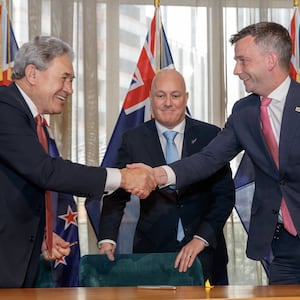Politics
New Zealand Leaders Distance from Luxon’s Netanyahu Remarks

New Zealand’s political landscape shifted this week as Deputy Prime Minister David Seymour and Foreign Affairs Minister Winston Peters publicly distanced themselves from comments made by Prime Minister Christopher Luxon. Luxon faced backlash after describing Israeli Prime Minister Benjamin Netanyahu as having “lost the plot” amidst the ongoing conflict in Gaza.
Seymour expressed his belief that it is often wiser to refrain from making public comments about international leaders. In an interview with the New Zealand Herald, he stated, “It’s better just to keep your thoughts to yourself.” Peters echoed this sentiment, indicating his preference for more measured language, saying, “It’s not language I use.” Both politicians opted to withhold immediate commentary last week while seeking to verify Luxon’s remarks and better understand their context.
Luxon’s controversial statement was made following a question from the Herald regarding remarks by Labour leader Chris Hipkins, who claimed an “unfolding genocide” was occurring in Gaza. This comment has intensified debates over the humanitarian crisis and New Zealand’s position on international conflicts.
In response to Luxon’s comments, Israeli Deputy Foreign Affairs Minister Sharren Haskel criticized the Prime Minister, suggesting he lacked the understanding necessary to grasp the complexities of dealing with Hamas. Haskel further remarked that New Zealand’s most pressing threats were more domestic in nature, quipping that “the most deadly enemy is a possum or a cat.”
The exchange highlights the delicate nature of international diplomacy, especially concerning the ongoing conflict in Gaza, which has drawn widespread attention and condemnation globally. As tensions escalate, leaders are increasingly scrutinized for their statements and positions on foreign affairs.
The incident underscores the challenges faced by New Zealand’s government as it navigates its foreign policy while addressing domestic concerns. The response from Seymour and Peters reflects a cautious approach to international relations, emphasizing the importance of context and thoughtfulness in political discourse.
-

 World1 week ago
World1 week agoPrivate Funeral Held for Dean Field and His Three Children
-

 Top Stories2 weeks ago
Top Stories2 weeks agoFuneral Planned for Field Siblings After Tragic House Fire
-

 Sports3 months ago
Sports3 months agoNetball New Zealand Stands Down Dame Noeline Taurua for Series
-

 Entertainment3 months ago
Entertainment3 months agoTributes Pour In for Lachlan Rofe, Reality Star, Dead at 47
-

 Entertainment2 months ago
Entertainment2 months agoNew ‘Maverick’ Chaser Joins Beat the Chasers Season Finale
-

 Sports3 months ago
Sports3 months agoSilver Ferns Legend Laura Langman Criticizes Team’s Attitude
-

 Sports1 month ago
Sports1 month agoEli Katoa Rushed to Hospital After Sideline Incident During Match
-

 World2 weeks ago
World2 weeks agoInvestigation Underway in Tragic Sanson House Fire Involving Family
-

 Politics2 months ago
Politics2 months agoNetball NZ Calls for Respect Amid Dame Taurua’s Standoff
-

 Top Stories2 weeks ago
Top Stories2 weeks agoShock and Grief Follow Tragic Family Deaths in New Zealand
-

 Entertainment3 months ago
Entertainment3 months agoKhloe Kardashian Embraces Innovative Stem Cell Therapy in Mexico
-

 World4 months ago
World4 months agoPolice Arrest Multiple Individuals During Funeral for Zain Taikato-Fox





















